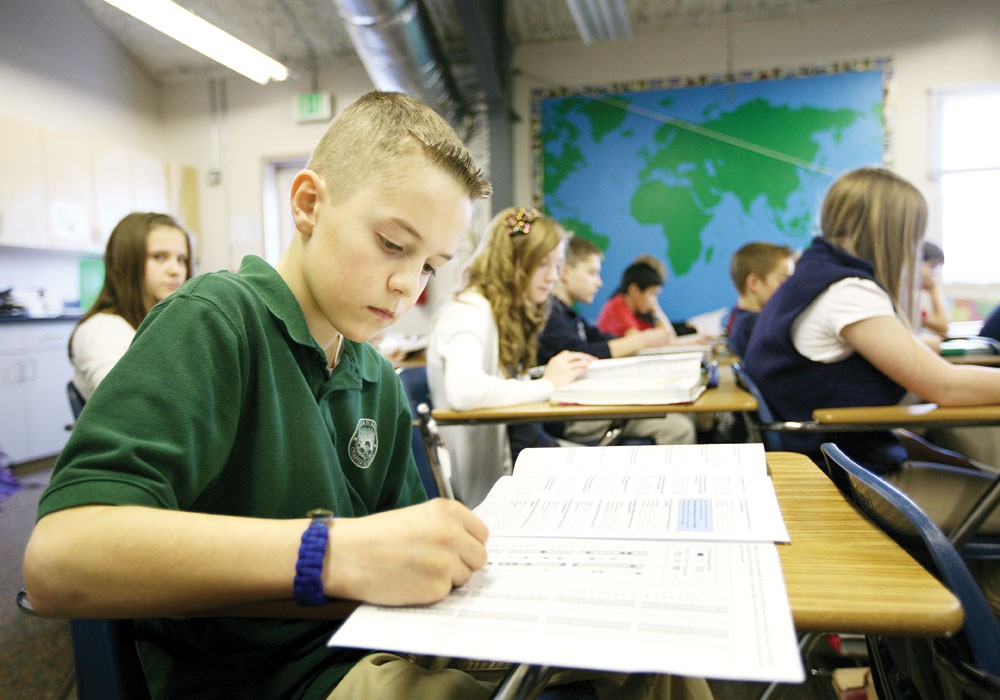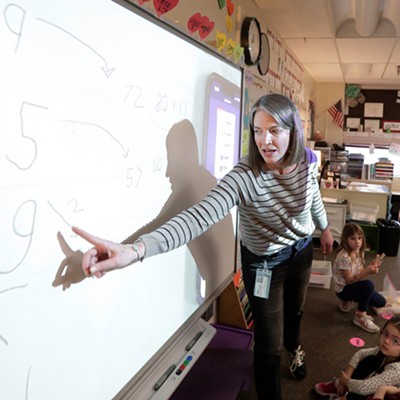
Students in Coeur d’Alene often have to win a lottery to get into Coeur d’Alene Charter Academy. That’s how sought-after their programs are. Every course in the curriculum — art and music included — has an intense academic, college-bound focus.
“In a regular public school, where everyone just shows up, the school doesn’t have the ability to press the whole class and push them,” Dan Nicklay says. “There’s a freedom on our side to pursue our mission with gusto.”
Idaho has 43 such charter schools — publicly funded, offering free tuition, but not controlled by the school district. Just across the border in Washington, however, charter schools are banned. But in the 60 days of the new legislative session in Olympia, one group of bipartisan legislators wants to change that.
A bill they’ve proposed would gradually allow a small number of charter schools to legally operate in Washington state, with certain restrictions. Only 10 new charter schools would be allowed each year, up to a total of 50 — out of over 2,000 public schools in the state. Only nonprofits could run these schools, and the schools would be shut down if they didn’t perform.
Popular documentary films like Waiting for Superman have recommended charter schools as an innovative solution to a failing school system. President Barack Obama praises them — he used his Race to the Top funding competition to push for charter school expansion.
But critics complain that charter schools have had mixed results.
Stanford University analyzed the results of several-thousand charter schools and found only 17 percent made better academic gains than public schools — and 37 percent did worse. And charter schools in states that limited the number of charters, as Washington’s bill would, did worse than states without a cap.
Charter schools are currently allowed in 41 states, yet Washington state voters have voted against charter schools three separate times. The most recent attempt passed the Legislature but, in 2004, was toppled in a referendum by a 58-percent no vote.
Part of the reason: the consistent opposition by the Washington Education Association. Among the state’s teachers union’s concerns are that the cost of paying for new schools could hit the education budget.
“We, right now in our state, are facing a huge budget crisis — why on Earth would we take money away from our existing schools?” asks Rich Wood, the union’s spokesman. “This isn’t about WEA, it’s about the education for our kids in our class rooms.
The Legislature is failing its constitutional obligation, but charter schools are a distraction.”
Yet, while the Democrat-friendly WEA pushes against the legislation, the bill’s lead sponsors in the both House and the Senate are Democrats.
In the Senate, it’s sponsored by Rodney Tom, D-Bellevue. While rich parents can send their kids to private schools, Tom says, students in low-income families don’t have the same options — unless you created charter schools.
“[Charter schools] can set their own salaries,” Tom says. “They can pick and choose who they want as teachers. If you want the best teachers, you have to be able to change them.” Charter schools wouldn’t have the same union restrictions as public schools.
Most nonprofits starting a charter school would have to be vetted by the state school board or a four-year state college before approval. And since the number of schools would be so limited, he says, only the best operators would be chosen.
As an example, Tom points to the Kipp Academy, a national charter school network that serves mostly low-income students. About 88 percent of the students at Kipp Academy who spent four or more years in the system went on to college.
“Charters is a studentcentric model, versus our current system,” Tom says. “If the school day needs to be longer, that may not be better for the teacher, but that’s better for the student.”
The Kipp Academy, for example, features an extended school day — 7:30 am to 5 pm — and mandatory summer school. But due to lower administrative costs, Kipp spokesman Steve Mancini says, the network usually runs on less public money than a public school, and still maximizes teacher pay.
But Rep. Andy Billig, D- Spokane, a member of the House Education Committee, says he hasn’t been convinced. Schools in Washington state already have flexibility in their structure, he says. In Spokane, the On Track academy customizes its curriculum for promising but struggling students. The Community School at Havermale lets students work on self-designed projects for three weeks at a time. Both are charter-school-style innovations, but both operate under the district’s control.
The problem with failing schools, Billig says, is socio-economics. His solutions have to do with early childhood education, better nutrition, all-day kindergarten and improving the overall economy — not charter schools.
Rep. Kevin Parker, R- Spokane, who sits on the state’s Achievement Gap and Oversight Committee, says he supports the concept of charter schools. He supports unconventional teaching methods and the focus on low-income students. But because of how often Washington has rejected the idea, he hasn’t yet signed on.
“I’m very, very leery when the public has repeatedly said no to a concept,” Parker says.
Tom, however, argues that charter school opponents like the WEA apply the will-of-the-people argument inconsistently. For example, the voters have repeatedly supported requiring a two-thirds majority for the Legislature to raise taxes — something the WEA’s strongly opposed to.
In states that already have charters schools, Tom says, the schools are extremely desired. Spots in a charter school are so valuable that students compete in a lottery — and are devastated when they don’t get in.
“It’s like everyone wants an iPad, but we’re not going to allow iPad sales in Washington state,” Tom argues.


























